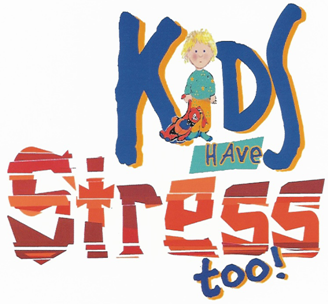
I wanted to share this week’s Global TV segment with you. In my coaching practice, I am seeing extraordinarily high levels of stress and tension in families lately as a common thread. Many of my female clients are stressed, burned out, and it’s being filtered down to their kids.
One study says 50% of kids today feel stressed out. Children’s tensions are on the rise due school pressures, peer pressure, family tensions and just plain every day living.
This week, I shared 5 strategies to de-stress your kids.
Some of these tips may appear to be common sense, but I have backed them up with scientific based evidence which may cause you not to second guess them.
Some helpful tips to bring down the heat:
1. Teach Your Child About BRAIN BREAKS And Deep Diaphragmatic Breathing When They Feel Stressed

“Taking deep, belly-filling breaths sends an all-clear signal to the nervous system that triggers the relaxation response: The heart beats more slowly, blood pressure comes down, and the muscles release tension,” says Dr. Susan Biali, M.D.
We now know the science behind deep belly breaths and the calming physiologic response it sends to our body.
How to teach it: Have your child sit or lie down and coach her to breathe in and out of her nose so that her belly fills with air and empties again. For a younger kid, coach her to fill her belly like a balloon as she breathes in and then let the air out as if she’s blowing water from her nose. You can also have her place a hand on her belly and try to move her hand up and down with each breath. For an older kid, tell him to try to imagine inhaling peace and exhaling frustration.
Times to try it: Lying in bed just before sleep; at school before a big test; during a major homework session, when she needs a “brain break.” (Via RealSimple.com)
2. Writing Daily in a Gratitude Journal

We have started doing this in our family, and the kids LOVE it! It can be as simple as, “Today I’m grateful that the girl I like talked to me.” Have each family member in your family write something that they are thankful for daily in a journal or notebook, at a set time of the day… after dinner or before bed is a great time. Shawn Achor, leading happiness researcher says his research shows keeping a gratitude journal significantly improves kids’ optimism even six months later. Other studies on have discovered that even ten minutes of mindfulness in children a day (where they focus solely on the present moment), can improve children’s success in school.
I have talked a lot about happiness before on Global TV— American psychologists did studies on writing about our dreams for the future, and the studies are in: writing about our dreams can actually make us happier and less stressed! After writing about their dreams 20 minutes a day, after 4 days, the subjects felt immediately happier and this effect lasted for several weeks.
Encourage your kids to write down what they are grateful for, and stick with it.
3. Meditation

I practice mediation with my boys very frequently (and even my husband is now warming up to it!) Before you go thinking I’m off my rocker, an amazing new study out of Harvard University on meditation just came out this week– “Harvard MRI Study Proving Meditation Literally Rebuilds The Brain’s Gray Matter In 8 Weeks.” This is exciting news in my world where I try to live a balanced life between alternative and conventional.
So now that we know this actually works, there are cd’s, mp3’s to download in iTunes for stress management designed just for kids that can guide them through exercises where they imagine themselves in relaxing situations and emerge from the experience calm and refreshed. This cd GUIDED MEDITATION FOR CHILDREN is my favorite and is downloadable right in iTunes for kids. I use Deepak’s Chopra’s STRESS FREE myself. There are even books which incorporate stress-reduction techniques into a storytelling format too. It’s trial and error till you find what works for you and your family.
4. Singing

Allow me to explain the science behind this – Singing stimulates the vagus nerve at the back of your throat which actually relaxes the mind and body. I invested in a Bose bluetooth speaker (that connects easily to my iPhone) that we bring from room to room. I make my boys play their favorite music and we boogie down in the kitchen, in the bathroom… daily! Physically SINGING and dancing too release endorphins and stimulate the happiness hormone in your body, while simultaneously helping to bring down the cortisol levels (your stress hormone). Put it on your Christmas list – any bluetooth wireless speaker will do and have your children partake as often as possible.

5. The N.U.T.S. Theory
Stress expert Sonia Lupien says stress is N.U.T.S! Literally. I have been using Sonia’s theory with my boys. While what stresses you or your child is different from what stresses your neighbor, the recipe for stress is universal. So are the ingredients.

There are triggers which cause our children to feel stress, worry and anxiety. The key is decoding or deconstructing the stressor to help them better understand what is making them upset, so we can then help them begin to reconstruct. For example, is it a new school or new camp that has your child anxious (the N here is Novelty)? Is their ego threatened because someone is picking on them or bullying them at school (the T in Threat to the ego)? Are the parents in the home fighting and therefore the child feels like they have little control over the situation (The S in Sense of control). Get how N.U.T.S. works?
Once you begin to understand what’s going on that is stressing your child (through talking with them), then you can help coach them, or reconstruct. Example, “It’s normal to feel anxious about starting a new school. Here are some strategies…”
And finally, another suggestion when your child is feeling stressed oven an exam for example, or other, encourage them to do 25 jumping jacks. Doing jumping jacks for an extended period sparks a chemical effect in your body. You release endorphins, which act as pain relievers and give you a sense of well-being, In addition, the deep breathing you do while exercising vigorously clears your mind, sharpens your focus and de-stresses. (Livestrong.com)

There are so many activities we practice daily in our home… all in hopes of creating a calm and peaceful environment to help alleviate stress. I give them lavender aromatherapy, I try and feed them a healthy balanced diet that includes whole grains, fresh fruits and vegetables filled with stress-fighting antioxidants. I am also obsessed with restorative sleep – it’s the most underrated secret to wellness. We go to bed early in our home, and I’m quite strict about bedtime for the kids. We talk about the things that worry us, and I remind them that sometimes, the very worst thing that is going to happen, is they will fail. They will fail and learn better strategies for next time. We’re constantly a work in progress here, but as a mom, I try my best.
I’d love to know how you fight stress in your home. Please, please, please share what works for you. It takes a village to raise a child.




One thing that helps my son if he’s upset over a particular event is just telling him all he can do is move forward. I always say, “Okay so you didn’t do well on the test, you can’t change that but what can you do to make it better? Don’t get upset over something you can’t change, think of positive solutions.” Then we brainstorm ways to fix the situation like asking the teacher to make up the test, asking for extra credit, doing really well on the next project/test etc.
We also talk about how bad the situation feels and how he can work to make sure it never happens again. I try to teach him that every choice has a consequence whether good or bad, that ways he’s empowered to make his life exactly as he wants it. So failing a test feels bad? Next time make a study guide two nights before the test so all you have to do the night before is actually memorize it, next time don’t go over your friends house on a night you have a test, next time make sure you have the right materials at home so you’re not stuck.
I think dwelling on things we can’t change is a huge reason for stress, taking a bad situation and making positive steps in a better direction will make anyone feel better. I heard him say to his teammates after losing a game to a much worse team, “All we can do is move forward. We’ll figure out why we lost and never lose to this team again.”
They ARE listening even if it doesn’t seem like it.
Tracy, I LOVE these strategies!! Thank you so much for sharing!!
Thanks Erica, I was a stressed out over-achiever my whole life and only have recently (in the last 5 years) learned how to manage my own stresses. I never wanted my son to feel the way I did so this is a topic near and dear to my heart.